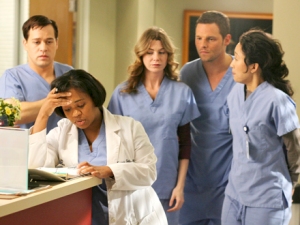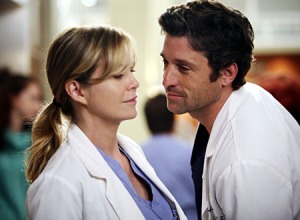(This is just a forewarning for anybody unfortunate enough to be only watching the show recently, like me, that there will be spoilers ahead pertaining to anything up to the season six finale, so be warned).
I don’t know how it happened. Since 2005, Grey’s Anatomy has been on the air, and it’s currently on its ninth season and inevitably will be moving onto its tenth this Fall. Eight years the show has been running; a very long time for any television show, and especially in today’s cut-throat landscape. And yet, by some major universal imbalance (this is the only explanation), I had yet to see a single scene from it until last month. Not one, and after spending the last month slamming the Netflix servers to catch up, I am dumbfounded that I ever let that happen.
After weeks of marathoning almost constantly (that’s what too much free time does to you), I’m currently approaching the mid-point of the seventh season, and to say that Grey’s Anatomy is a fun, exciting, constantly compelling and addictive show would be merely skirting around the truth, and which I’ll cover later on. It’s all of those, yes, but you can’t truly comprehend just how much so until you check in to Seattle Grace for yourself.
 It’s almost instantly noticeable. Before watching Grey’s, my most recent experience with a medical drama was with House, which always concentrated mostly on the cases of the week with its characters in the background. It worked well for a while, but ultimately it’s what led to House becoming a chore to watch; a weekly repetition of the same formula with little deviation or willingness to explore other avenues. I was worried that Grey’s might follow the same pattern, but I was so very wrong.
It’s almost instantly noticeable. Before watching Grey’s, my most recent experience with a medical drama was with House, which always concentrated mostly on the cases of the week with its characters in the background. It worked well for a while, but ultimately it’s what led to House becoming a chore to watch; a weekly repetition of the same formula with little deviation or willingness to explore other avenues. I was worried that Grey’s might follow the same pattern, but I was so very wrong.
While the aforementioned House was very procedural, and consequently mundane, Grey’s Anatomy chooses a more serialized format. It has patients flitting in and out of the story, expectedly, but a lot of them seem to exist purely to give the characters something to stand around and interact with each other. The show seems to have found the perfect balance between a completely serialized structure, impenetrable to people arriving after the premiere, and procedural elements to make each season stretch to twenty-plus episodes, and this is why it’s ridiculously enthralling.
On the other hand, Grey’s is not entirely procedural, so arriving in the middle of the action would be a little confusing, obviously, but wouldn’t be likely to leave you feeling like you’d lost a chunk of time, X-Files style. As I said earlier, this is why the show leaves you wanting more and more, even after you’ve just spent the last four hours letting Netflix autoplay destroy your life; it drip feeds the many story arcs to you slowly in each episode, and surrounds those drops with material to keep you occupied in the meantime. Of those story arcs, nearly all usually belong to the show’s characters, whom the show lives and dies by.
 To put it simply, Grey’s Anatomy has an excellent cast, whether it’s the earlier crew you look at or the more recent crop. Also, because everybody at Seattle Grace seems to be sleeping with each other (and because there’s so many of them), it makes for great, intense drama. It’s soapy and it’s outlandish and frequently ventures out of the realm of realism, but it’s just brilliant. Some shows would attempt to shy away from their nature and pretend they’re something else, but Grey’s Anatomy embraces it and utilises it to make itself what it is.
To put it simply, Grey’s Anatomy has an excellent cast, whether it’s the earlier crew you look at or the more recent crop. Also, because everybody at Seattle Grace seems to be sleeping with each other (and because there’s so many of them), it makes for great, intense drama. It’s soapy and it’s outlandish and frequently ventures out of the realm of realism, but it’s just brilliant. Some shows would attempt to shy away from their nature and pretend they’re something else, but Grey’s Anatomy embraces it and utilises it to make itself what it is.
There aren’t really any characters of the show that I actively dislike (there was Rose but she wasn’t ever a recurring character and she was an idiot). I adore Meredith and Derek’s central relationship immensely, simply because their characters are wonderful and work the best when they’re in close proximity to each other–and because both Ellen Pompeo and Patrick Dempsey have a natural charisma that, when combined, is electrifying. Their pairing can easily be defined as the show’s central romance, but because everybody is bonking each other, there are a lot more circling the stewing pot.
For example, we had Derek’s wife, Addison, make an impromptu arrival at the first season’s conclusion, to reunite–albeit briefly–with her husband. Then we had George sleeping with not one but two fellow interns, both culminating in disaster. Alex has probably slept with a quarter of the entire hospital staff before marrying Izzie as she lay dying of cancer, before also ending in disaster. Plus, Derek’s friend Sloan has bedded more women than you can possibly count before forming a relationship with Lexie, which also ended badly (seeing the theme yet?). Oh, and Cristina almost married Burke, who then ditched her at the altar and was never seen again, and now she’s with Owen (for the time being).
 As you can see, Grey’s is defined by its characters, what they do, who they do it with and what happens as a result of that. Relationships are formed all the time, and die just as quickly, making for some exciting drama that in turn forms the majority of the show’s story arcs. You’ll root for them, and you’ll enjoy their relationship, and then something will happen to bring the house of cards tumbling down, and the pain it brings will be felt across the board. Shonda Rhimes seems to be the master of inflicting terrible, nauseating pain, and Grey’s is her platform for doing it.
As you can see, Grey’s is defined by its characters, what they do, who they do it with and what happens as a result of that. Relationships are formed all the time, and die just as quickly, making for some exciting drama that in turn forms the majority of the show’s story arcs. You’ll root for them, and you’ll enjoy their relationship, and then something will happen to bring the house of cards tumbling down, and the pain it brings will be felt across the board. Shonda Rhimes seems to be the master of inflicting terrible, nauseating pain, and Grey’s is her platform for doing it.
Although the characters drive the show, the fact that Grey’s pretty much operates (no pun intended) out of one central location brings them all together, grounding the narrative and increasing the effect any story has so that it resonates with the rest of the characters rather than being restricted to just a few. For example, Meredith and George’s almost-sex in season two. Had the story been scattered, it probably would’ve only affected just those two characters, but with Grey’s, the aftermath took place in the hospital, encompassing everybody in the surrounding area so that the drama produced was more profound and had an effect on those not directly involved.
This kind of format works incredibly well for Grey’s, and it’s particularly noticeable during any of the show’s ‘disaster episodes’. Because the show is aware of how outrageous it sometimes is, it occasionally throws everything into disarray with a disaster, whether it’s the body containing the unexploded grenade in season two, the ferry disaster in season three, the gunman’s rampage in season six, or any of the other smaller events peppered between them. These events drag every character into the vicinity and go all-out in inflicting tremendous amounts of brilliant, exciting, captivating misery on the characters and the viewers. I’ve seen disaster episodes on television before, most recently in Desperate Housewives (another show embracing of its soapy nature), but none have done them quite as well as Grey’s.
 As much as I love Grey’s Anatomy (and that’s a lot), it is unfortunate that in the seasons I’ve watched so far, there have been numerous duds. In regards to this, I’m talking about Derek and Rose’s pairing, which sort of just sprung from nowhere, as well as nearly anything involving Hahn, who could’ve been a character I adored but the constant ass-kissing from the other characters made me instantly dislike her. However, none quite compare to season five’s ‘ghost sex’ storyline.
As much as I love Grey’s Anatomy (and that’s a lot), it is unfortunate that in the seasons I’ve watched so far, there have been numerous duds. In regards to this, I’m talking about Derek and Rose’s pairing, which sort of just sprung from nowhere, as well as nearly anything involving Hahn, who could’ve been a character I adored but the constant ass-kissing from the other characters made me instantly dislike her. However, none quite compare to season five’s ‘ghost sex’ storyline.
For reasons unfathomable to me, a group of writers–spearheaded by Shonda Rhimes–sat at a desk and actually conjured up the idea that Izzie, who was unknowingly suffering from cancer, would hallucinate Denny–her dead lover from season two–and subsequently appear to have sex with him. Not only that, but Izzie, a qualified doctor, would fail to realise she was sick until many, many episodes later–and that we, as the viewers, might actually see this ridiculous, moronic plot play out and find it good.
What they somehow failed to predict is that this story single-handedly made both Izzie and Alex–whom Izzie told of her hallucinations and whom brushed them off–look foolish and idiotic. It damaged their characters, even if it wasn’t irreparable, and almost completely trashed the whole cancer storyline, which when ignoring the beginnings of it, is one of the best the show has done so far.
 As I said previously, Grey’s benefits from knowing it often deals with outrageous plots that wouldn’t be out of place in a soap opera, but there is a limit in how much they can embrace that. The ghost sex plot exceeded that limit massively, and is easily the worst thing the show has done. I can’t judge anything beyond the point I’m currently at, but I very much doubt it could do anything worse, and I hope that remains true.
As I said previously, Grey’s benefits from knowing it often deals with outrageous plots that wouldn’t be out of place in a soap opera, but there is a limit in how much they can embrace that. The ghost sex plot exceeded that limit massively, and is easily the worst thing the show has done. I can’t judge anything beyond the point I’m currently at, but I very much doubt it could do anything worse, and I hope that remains true.
In the time I’ve spent watching Grey’s Anatomy so far, I’ve felt happiness, joy, amusement and excitement, and for every one of those, a moment of pain, horror, discontentment and devastation was lurking around the corner. This is what Grey’s Anatomy succeeds at the most; it makes you care, makes you relate to the fictional characters on your screen, then ruins everything. This is why the show continues to be one of the most painfully enslaving and irresistible experiences that I’ve had the fortune to watch, and how eight years passed by without me becoming entangled in Shonda Rhimes’ web remains a question with no discernible answer.
Now, let’s load Netflix back up…
Pingback: Community Post: 18 Groups Of People That Don't Necessarily Get A Day Off On Thanksgiving - Football Mashups